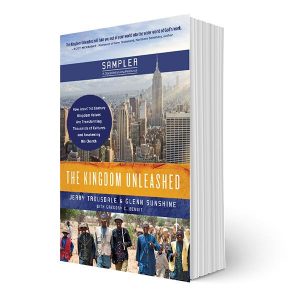How to Pray the Lord’s Prayer—in Today’s World
 The following is an excerpt from The Kingdom Unleashed Sampler. Download this free eBook here.
The following is an excerpt from The Kingdom Unleashed Sampler. Download this free eBook here.
Observant Jews in Jesus’ day prayed the Amidah (also known as the Eighteen Benedictions) three times per day. They understood this to be a sacred obligation, and failure to do so was a sin. These prayers took a good amount of time, however. Rabbis and other “professionals” could be counted on to recite them regularly, but praying the entire Amidah three times per day could be a burden for the average person with a job and a family. Students thus asked rabbis for a more concise version of the prayers that would be more practical for them to say and would still fulfill their religious obligations.
This context helps explain what was happening in Luke 11, when Jesus’ disciples came to Him and asked Him to teach them to pray—the way that John the Baptist taught his disciples to pray: the disciples wanted to find the core of the Amidah that they could recite three times daily. Jesus’ answer was to give them the Lord’s Prayer, which is remarkably similar to some of the shortened versions of the Amidah that survive from the period.
For Jesus, then, the Lord’s Prayer was the distilled essence of what prayer should be. He intended it to be recited, but it also reflects His priorities for prayer, making it a model for how we should pray all the time. It is also a summary of His entire ministry and message.
This is an excerpt from The Kingdom Unleashed Sampler. Download this free eBook here.
Many Christians often repeat the words of the Lord’s Prayer, yet when we pray in our own words, we generally miss the prayer’s key themes. This is both remarkable and lamentable—yet a closer look at what Jesus said will help us see what He was focused on. Let’s look more closely at the Lord’s Prayer in order to discover Jesus’ top three priorities concerning prayer:
That the Father’s name would be glorified in the world around us
That His Kingdom would be ushered in with power
That the people of the world—and particularly His followers—would obey the Word and will of the Father
Our Father in heaven, Hallowed be Your name
Jesus’ first priority is God’ glory. His intent in this petition is something like: May the holiness and glory of God in heaven be manifested where I live!
Your kingdom come
The second thing that Jesus asks us to pray for is that the Kingdom of God will advance on earth. May the reign of God in heaven be established where I live!
Your will be done on earth as it is in heaven
It is likely that the phrase “as it is in heaven” actually applies, not just to “your will be done” but to all three of the preceding petitions: “Hallowed be your name, as hallowed on earth as it is in heaven. Your kingdom come on earth as it is in heaven. And may the perfect will of God be established in me as fully as it is established in heaven—and among all the peoples of the world!”
Do you see a common theme in the first three petitions? Out of a heart of gratitude they are a plea that:
- God’s glory may be revealed to people where I live
- God’s kingdom reign and authority may advance where I live
- God’s will may be established in perfect obedience where I live
Before moving to the next petitions, it is worth asking how closely our top three prayer priorities align with Jesus’ prayer priorities. Are they God’s glory, God’s Kingdom, and God’s will, or are they more about us than about God?
Give us this day our daily bread.
May the resources of God’s kingdom sustain our needs day-by-day.
And forgive us our debts, as we forgive our debtors
May the Lord be merciful to me, a sinner, and may I generously extend that same forgiveness to others.
And do not lead us into temptation,
May God’s Spirit keep my heart, my feet, my eyes, and my ears from places of temptation.
But deliver us from the evil one.
May the Holy Spirit enable me to resist Satan’s temptations and empower me to be effective in redeeming people unto God from the kingdom of darkness. May the power of evil be voided where I live.
For Yours is the kingdom and the power and the glory forever. Amen.
This passage is almost certainly not a part of Jesus’ original prayer, but it is in keeping with the prayer’s spirit. It provides the entire reason for this prayer, and indeed all prayers. Prayer is intended to bring God glory. In modern English, this closing sentence might mean something like this: “We are asking these things because it is Your Kingdom that is being built as You answer these prayers, and it is Your power—and Your power only—which will accomplish these things, and Your answer to our prayer will bring You glory forever.”
Jesus had much more to say about prayer, of course. In fact, He taught more about prayer than about any other subject except the Kingdom of God. We also know that both He and the early church prayed the Psalms, and the great prayers that we find recorded throughout the centuries are saturated with the words of the Psalter. We find profound and powerful prayers recorded elsewhere in Scripture, such as in Paul’s epistles, but in all cases, they reflect the petitions and priorities of the Lord’s Prayer.
This is an excerpt from The Kingdom Unleashed Sampler. Download this free eBook here.
Order the Full-Length Book Here.
Authors
JERRY TROUSDALE and his wife Gayle were missionaries among a Muslim people group in Africa. He pastored two mission sending churches, co-founded Final Command Ministries, and since 2005, has been Director of International Ministries for New Generations. He is also the author of best-selling book Miraculous Movements.
GLENN SUNSHINE is a professor of history at Central Connecticut State University, a senior fellow at the Colson Center for Christian Worldview, and the founder and president of Every Square Inch Ministries. He is an award-winning author, and has taught seminars on worldview, church history, and theology across the U.S. and in Europe and Asia.
GREGORY C. BENOIT brought his rich background in journalism, theology, and Christian publishing to this project.
 The following is an excerpt from The Kingdom Unleashed Sampler.
The following is an excerpt from The Kingdom Unleashed Sampler. 




